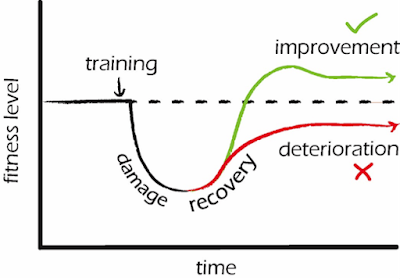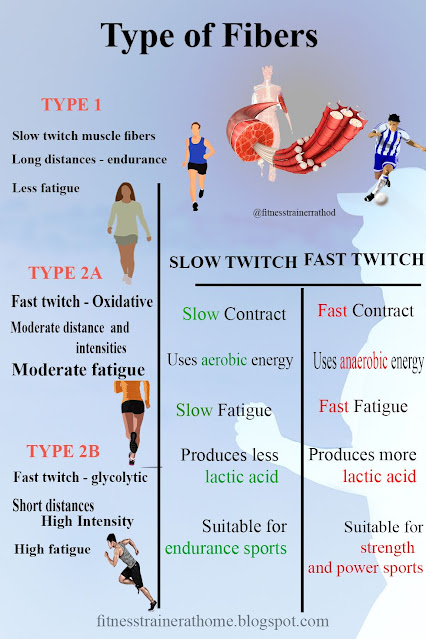What is muscle recovery?
Muscle recovery is a term used by bodybuilders, strength trainers, and athletes for the recovery of muscle fibres that are broken down during exercise. Every time we activate our muscles, we cause temporary damage known as micro-tears. These tears are repaired by the body during muscle recovery and the muscle is adapted.
Training with heavy weights or explosive motions can cause a lot of micro-tears in a muscle leading to a longer recovery time.
Bodybuilders and strength trainers need to dedicate time to recovery, especially when starting, as they are putting their muscles under excessive load and causing a lot of microtears.
After a while, the muscles learn to recover and adapt quickly so recovery times can be reduced for experienced lifters.
The Importance of Muscle Recovery After Working Out?
It is important to recover after putting your body through a work-out. Your muscles and joints need time to repair, your central nervous system needs to recover, and you need to rehydrate.
If you do not allow recovery between training sessions, you will lose muscle density, and muscle size, and risk injury.
A good gym training plan is one that is structured to allow enough recovery time for the muscles that have been activated. Training one muscle group every day without sufficient recovery and rest can lead to overtraining and a loss of any gains that you may have made.
There is an exception to the rule, and that is planned over-training (otherwise known as accumulation training).
This is a technique used by weightlifters and strength athletes to deliberately overtrain the muscles over a short period of time so that they become totally depleted and broken down.
This overtraining period is then followed by a de-load period with no training and that allows the muscle to fully recover and adapt.
This is a great strength-building strategy, but it is only for advanced lifters with plenty of experience.
You can view our free Super Accumulation Program for strength by clicking this link.
How long does muscle recovery take after working out?
Muscle recovery time after a workout can vary depending on your genetics, your lifestyle, the muscles activated and the amount of damage to the muscle.
If you work out a muscle that is predominantly made up of slow-twitch fibres. It will usually recover within 24 hours with good nutrition, rest, and stretching.
Muscles that are made up predominantly of fast-twitch fibres take much longer to repair. Sometimes, up to 5 days if you are new to bodybuilding.
If you plan your training well, you can activate the slow-twitch muscles 3-4 times a week and the fast-twitch muscles 1-2 times a week. This will make sure that you are achieving the maximum hypertrophy for each muscle.
Is muscle recovery important for muscle growth?
If you are more interested in muscle growth than muscle strength, you will need to allow plenty of time for certain muscles to recover. A good hypertrophy workout split, such as our HyperGrowth program, allows for optimal recovery time based on muscle construction.
Some muscles recover faster than others and just do not get sore. The rear delts are a prime example. They usually fully recover from resistance training in under 24 hours, meaning that they can be trained nearly every day.
The hamstrings, on the other hand, seem to stay sore for days and are at extreme risk of injury if not fully recovered before training.
Elite bodybuilders will cycle anabolic steroids as it drastically reduces muscle recovery time allowing for more frequent training.
While we do not suggest you go to these extremes, it is a demonstration of the importance that should be placed on recovery and how it affects muscle growth.
Why do muscles take so long to repair after a workout?
There are a few factors that may affect the recovery time required for different people.
- Age - As we get older, our body produces fewer growth hormones and muscles take longer to repair after a workout. Younger lifters can repair and adapt much faster as their bodies are still producing high levels of growth hormones.
- Genetics - Some people are just born with fast recovering muscles!
- Your ability.- New lifters will find that it takes them longer to recover because their bodies are just not used to the breakdown, repair and adapt cycle. If you train frequently and consistently, your body soon learns how to repair and adapt more efficiently.
- Your lifestyle - If you lead a sedentary lifestyle, your body starts to shut itself down and not provide the nutrients to the muscles required for recovery. Try to stay lightly active on your rest days.
- Your diet - If you are eating a lot of junk food between training sessions, your muscles will not be getting the nutrients that they need for recovery.
- Your nutrition - This goes beyond diet. Make sure that you are taking a good multivitamin, fish oil and protein supplements for optimal recovery. Also, make sure that you are taking BCAAs during your workout and a fast-acting protein straight after working out to kickstart the recovery process.
Is muscle soreness good after a workout?
Muscle soreness after a workout is totally normal and should be embraced. It is a sign that you have caused a lot of micro-tears in the muscle and that is in the process of repairing.
If you are new to the gym and lifting weights, the muscle soreness can seem quite extreme and last a few days, but as you progress, your body adapts and learns how to recover quicker.
This muscle soreness is known as DOMS (delayed onset muscle syndrome) and usually occurs a day or two after training.
It can lead to temporary mobility issues, especially when it is in the legs, but will only last a couple of days.
Can I still train with sore muscles?
If your muscles are sore, it is a sign that they are still recovering and it is not a good idea to train them again.
Wait until they have fully recovered and repaired and then train them again. This may be annoying if you are restricted by time or trying to stick to a training split, but it will help you in the long run and prevent any injury.
If you are following an accumulation training program, training through soreness is part of the deal, but for general fitness or hypertrophy, learn to listen to your body.
What can I do to speed up recovery after working out?
There are a few things that you can do to speed up the recovery process after working out...
- Stretch immediately after your workout, before bed and the following day.
- Sip on BCAAs during your workout.
- Drink a whey protein, whey isolate or vegan protein drink as soon as you finish working out.
- Eat small, clean meals every 3 hours that are high in protein, healthy fats, and clean carbohydrates.
- Utilize rest days with plenty of stretching and light activity to keep the blood pumping.
- Get at least 8 hours of REM sleep every night. This is peak muscle repair time!
- Use a foam roller to massage the sore muscles.
- Supplement with multivitamins, fish oils, and protein if required.
- Drink plenty of water and stay hydrated.
Conclusion.
Recovery is one of the most important elements of bodybuilding and strength training. It can be boring and frustrating, especially when you are itching to get back into the gym, but it is necessary.
If your muscles are sore, take some time out and follow the steps in this guide. Look after your body and learn how to listen to it.
FREE TRAINING PROGRAMS
Gymenix offers a selection of free training programs to suit all abilities and goals. Click on the links below for FREE access.





.png)




